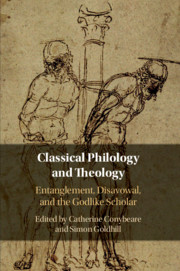Book contents
- Classical Philology and Theology
- Classical Philology and Theology
- Copyright page
- Contents
- Contributors
- Chapter 1 Philology’s Shadow
- Chapter 2 Philology’s Roommate: Hermeneutics, Antiquity, and the Seminar
- Chapter 3 The Union and Divorce of Classical Philology and Theology
- Chapter 4 The Philology of Judaism: Zacharias Frankel, the Septuagint, and the Jewish Study of Ancient Greek in the Nineteenth Century
- Chapter 5 Source, Original, and Authenticity between Philology and Theology
- Chapter 6 Whose Handmaiden? ‘Hellenisation’ between Philology and Theology
- Chapter 7 Julian the Emperor on Statues (of Himself)
- Chapter 8 Boethius in the Genres of the Book: Philology, Theology, Codicology
- Chapter 9 Virgil, Creator of the World
- Chapter 10 Theology’s Shadow
- Bibliography
- Index
Chapter 5 - Source, Original, and Authenticity between Philology and Theology
Published online by Cambridge University Press: 03 September 2020
- Classical Philology and Theology
- Classical Philology and Theology
- Copyright page
- Contents
- Contributors
- Chapter 1 Philology’s Shadow
- Chapter 2 Philology’s Roommate: Hermeneutics, Antiquity, and the Seminar
- Chapter 3 The Union and Divorce of Classical Philology and Theology
- Chapter 4 The Philology of Judaism: Zacharias Frankel, the Septuagint, and the Jewish Study of Ancient Greek in the Nineteenth Century
- Chapter 5 Source, Original, and Authenticity between Philology and Theology
- Chapter 6 Whose Handmaiden? ‘Hellenisation’ between Philology and Theology
- Chapter 7 Julian the Emperor on Statues (of Himself)
- Chapter 8 Boethius in the Genres of the Book: Philology, Theology, Codicology
- Chapter 9 Virgil, Creator of the World
- Chapter 10 Theology’s Shadow
- Bibliography
- Index
Summary
This chapter exposes the fundamental interpenetration of critical ideas and practices in the editing of texts of both classical and scriptural writings, one of the defining practices of philology, and shows a shared commitment to the return ad fontes. It focuses on one of the giants of philology, Karl Lachmann, and maps the ease with which the founding scholars of the modern discipline of classical philology moved between Greco-Roman texts and the bible. The chapter emphasizes the historical importance of that vast monument of Greek literature generally ignored in the modern discipline of classics, the Septuagint. It goes on to address the issue of authenticity, a key component not just of philology’s pursuit of the faked or corrupt, but also of theology’s commitment to the true word of God, and to show how the search for a source matches the idea of the godlike author.
- Type
- Chapter
- Information
- Classical Philology and TheologyEntanglement, Disavowal, and the Godlike Scholar, pp. 86 - 109Publisher: Cambridge University PressPrint publication year: 2020
- 1
- Cited by

